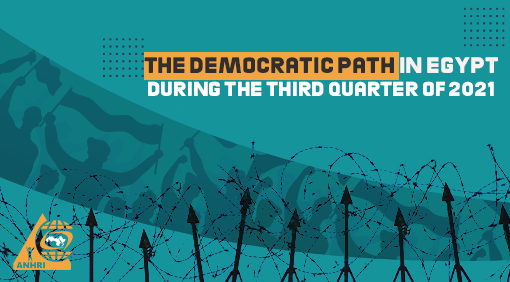
The Arabic Network for Human Rights Information (ANHRI)
“Lawyers for Democracy” Initiative
Summary:
This is the third quarterly report released by the Arabic Network for Human Rights Information (ANHRI) throughout the year 2021, covering the period from July 2021 to September 2021 monitor the state of the democratic path in Egypt, which included the following:
– The State Security Prosecution has continued to circumvent the provisions of the law, which set out a legal limit of two years for pretrial detention; by referring human rights lawyer and former parliamentarian Zyiad El-Eliemy, along with journalists Hisham Fouad and Hossam, to the Masr Al-Qadeima Emergency State Security Court (whose rulings are final and may not be appealed), after they had already exceeded the maximum limit of remand detention over Case No. 930 of 2019 Supreme State Security, in which the three are charged with publishing false news and statements against the backdrop of reports published in 2016.
– Egypt’s House of Representatives approved the President’s decree extending the state of emergency countrywide for a period of three more months. The Parliament has also given final approval to a draft law amending some provisions of Law No. 10 of 1973 regarding the non-disciplinary dismissal of civil servants. These amendments aim to dismiss employees from the state’s administrative apparatus without imposing an administrative penalty for mere suspicion of their affiliation with terrorist groups or for mere doubts that they undermine the country’s national security. The Parliament has previously approved the draft law in its entirety and referred it to the State Council.
– The Case 173/2011 known in the media as “closure of civil society” has resurfaced once again by summoning for investigation a number of human rights defenders including: Gamal Eid, executive director of the Arabic Network for Human Rights Information (ANHRI), human rights lawyer Negad Al-Borai, and Hossam Bahgat, founder of the Egyptian Initiative for Personal Rights (EIPR). The court ruled that that there is no sufficient evidence to lodge the criminal lawsuit against a number of human rights institutions and accordingly close the investigations with their representatives.
– The Permanent Supreme Committee for Human Rights, a body established in 2018 by Prime Minister, has launched the National Human Rights Strategy for the Arab Republic of Egypt 2021-2026, while the President declared 2022 the year of civil society, without taking some clear and explicit steps or moves to end the files of the extended pretrial detention and the rotation of detainees (adding defendants to new cases while in detention), or putting an end to the prosecution of writers and opinion-holders, or closing the case publicly known as “closure of civil society”. This strategy is just ink on paper and an attempt to show the external world that the Egyptian state is caring for human rights by presenting an image that is totally different from the reality on the ground.
Protest events didn’t stop during the third quarter of 2021; as 47 protests were staged by different political forces throughout this period. Social and labor protests were at the forefront of such protest events with 36 protests being organized. Meanwhile, the protest activities held by the Muslim Brotherhood (MB) and its supporters have continued to decline; as only 10 protests were recorded, all were organized in individual forms and in remote villages, coinciding with the anniversary of the dispersal of “Al-Nahda” and “Rabaa” Sit-ins. On the other hand, students organized three protest activities to denounce the Thanawyia Amma exams’ results, while the reporting period didn’t witness any protests staged by either civil forces or pro-regime affiliates.
Military trials of civilians also continued in the third quarter of the year; as among the 46 ongoing trials held during the reporting period, there were three military trials against 449 citizens.
Violations of media freedoms have not ceased as well, with 35 cases of violations recorded during the reporting period, most notably in the investigations, detention renewal sessions, and trials, which recorded 18 violations.
The details of the state of the democratic path during the 3rd quarter of 2021 are outlined, in numbers and percentages, as follows:
First: Protest events
During the third quarter of the year, the various forces organized 47 different events, and their distribution was as follows:
* Social and labor protests: 36 protest events
* The Muslim Brotherhood (MB) group and its supporters: 8
* Student protests: 3 protest events
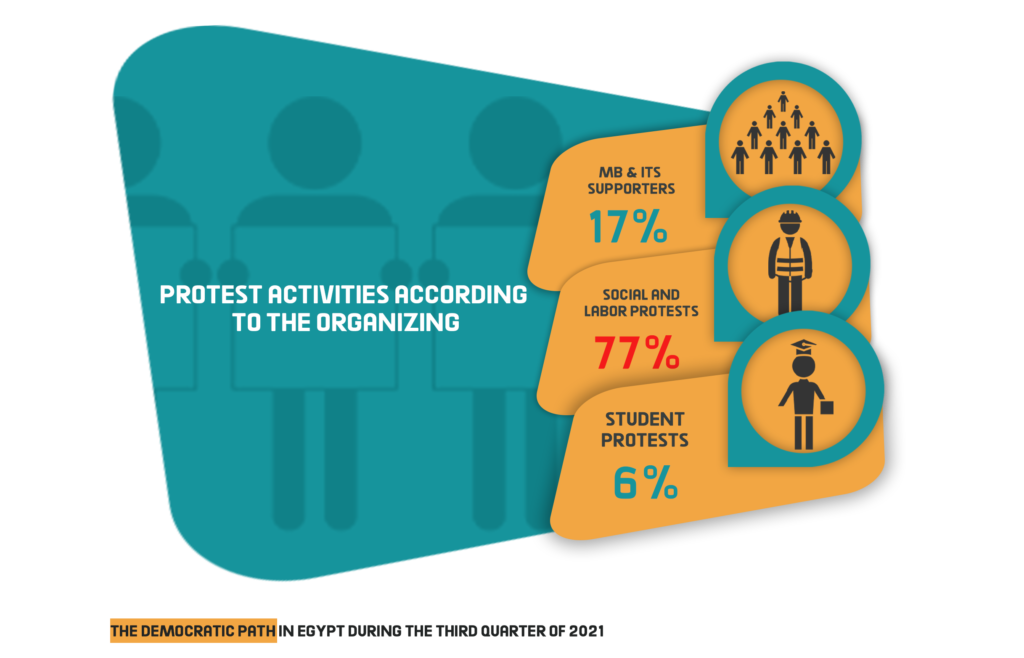
The month of August came first in witnessing the largest number of protest events with 21 different protests, as shown in the following table:
| July | August | September | Total |
| 12 | 21 | 14 | 47 |
Out of these different events, five were attacked by security forces, 36 passed without attacks, and five protests were resolved after negotiations with their participants.
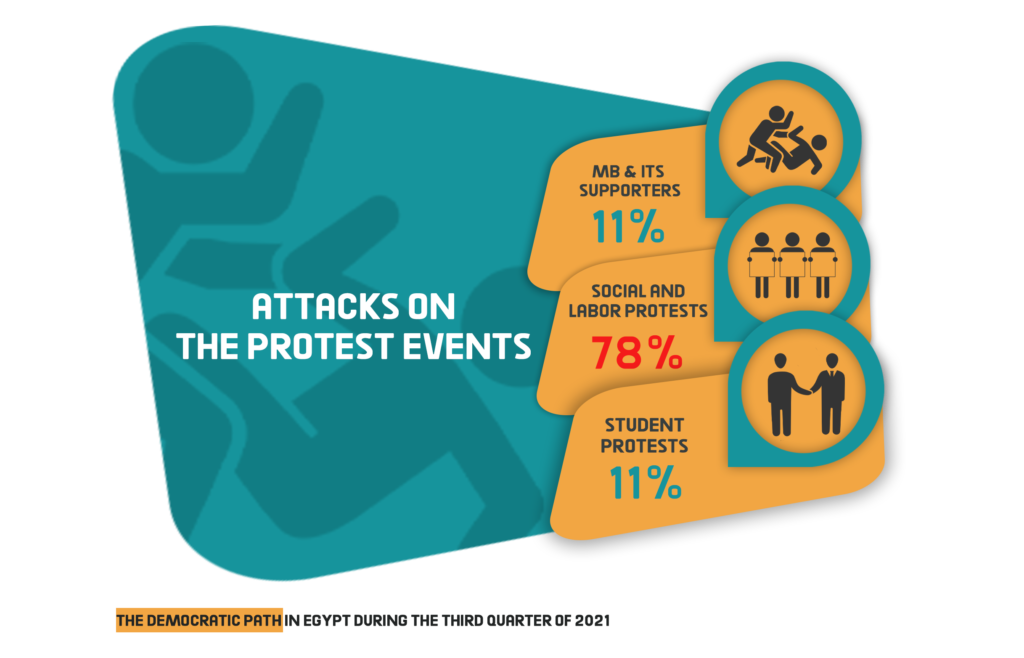
Labor and Social protests:
The third quarter of 2021 witnessed 36 different social and labor protests being organized, three of which was attacked by security forces, whereas 28 passed without interference and five were resolved after negotiations with their organizers.
The most important demands brought by the social and labor protests:
- Demanding better wages and that the families of workers are added to the health system.
- A number of lawyers staged a sit-in in Kafr El-Dawwar city (Behira governorate) to protest the mistreatment of a public prosecutor and his continued crackdown on them, calling to hold him accountable.
- Protests by El Max in Alexandria, Ezbet Khair Allah in Cairo, and Bulaq El Dakrour in Giza.
- Universal factory workers went on strike to demand better wages and the release of their arrested co-workers.
- Protesting the lack of health services in the city of Manfalut, Assiut governorate.
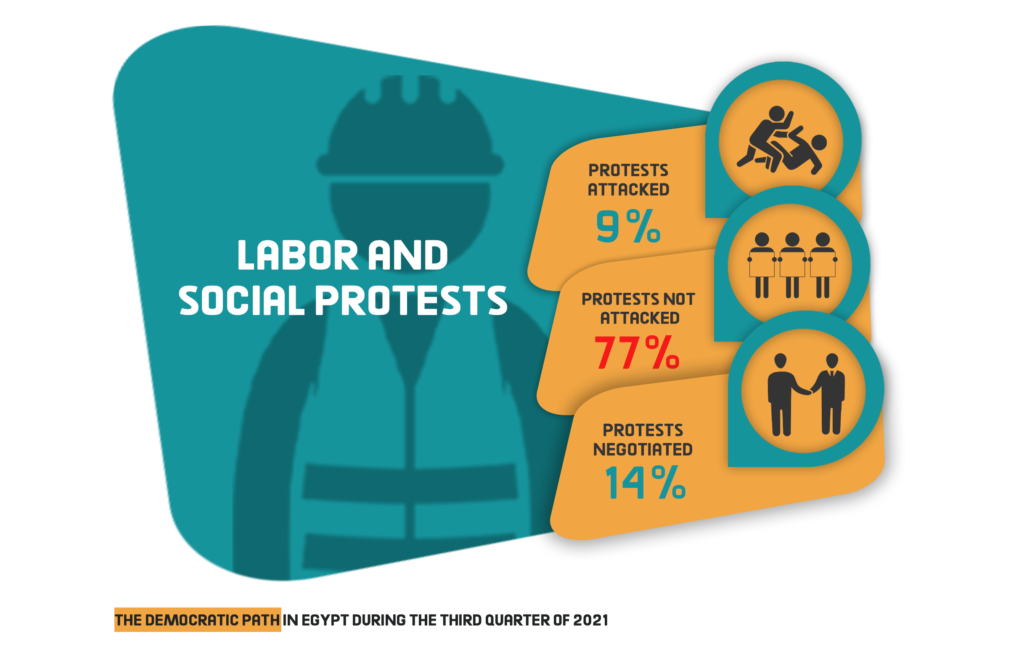
MB and NASL protest activities:
The third quarter of 2021 witnessed the Muslim Brotherhood (MB) organizing 8 protests, all of which took place in remote villages throughout Egypt governorates, in conjunction with the anniversary of the dispersal of the Rabaa al-Adawiya and al-Nahda sit-ins. Six of these protests were left without intervention by the security forces, while the other two were resolved.
The most important demands raised by Muslim Brotherhood and the National Alliance to Support Legitimacy:
- Commemorating the anniversary of Rabaa al-Adawiya and al-Nahda sit-ins’ dispersal.
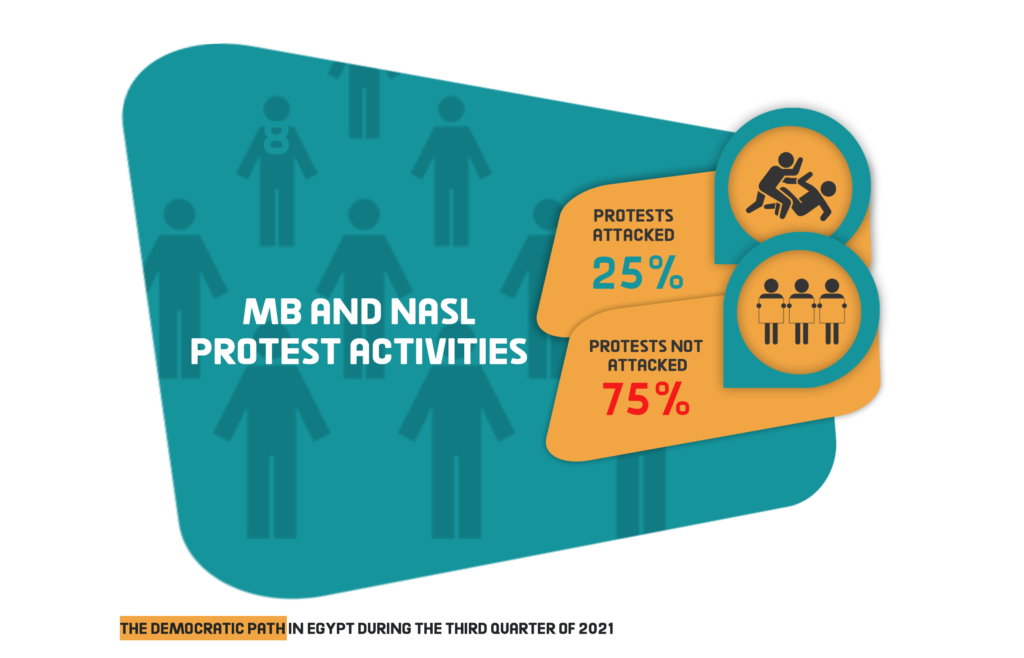
Student activities:
The third quarter of the year witnessed students organizing 3 protest events all of which hadn’t been subject to any attacks by the security forces.
Student protests’ main demands:
- A number of high school (Thanwyia Amma) students objected to the results of the final exams and the lack of an answer form/model.
Second: Trials
The third quarter of 2021 witnessed 46 trial cases that are being considered before the Egyptian judiciary, including three deliberating before the military court. Of these, there were 25 rulings of conviction, 10 acquittals and 42 death sentences, including 32 against 69 defendants over criminal cases and 10 rulings against 42 defendants pending political cases.
1) Ongoing trials:
The distribution of the ongoing 46 trials is as follows:
* 43 trials for the MB & its supporters.
* 6 trials of the civil and democratic powers.
* 2 trials for Mubarak’s regime’s affiliates.
* The military judiciary considered three trials for 449 civilians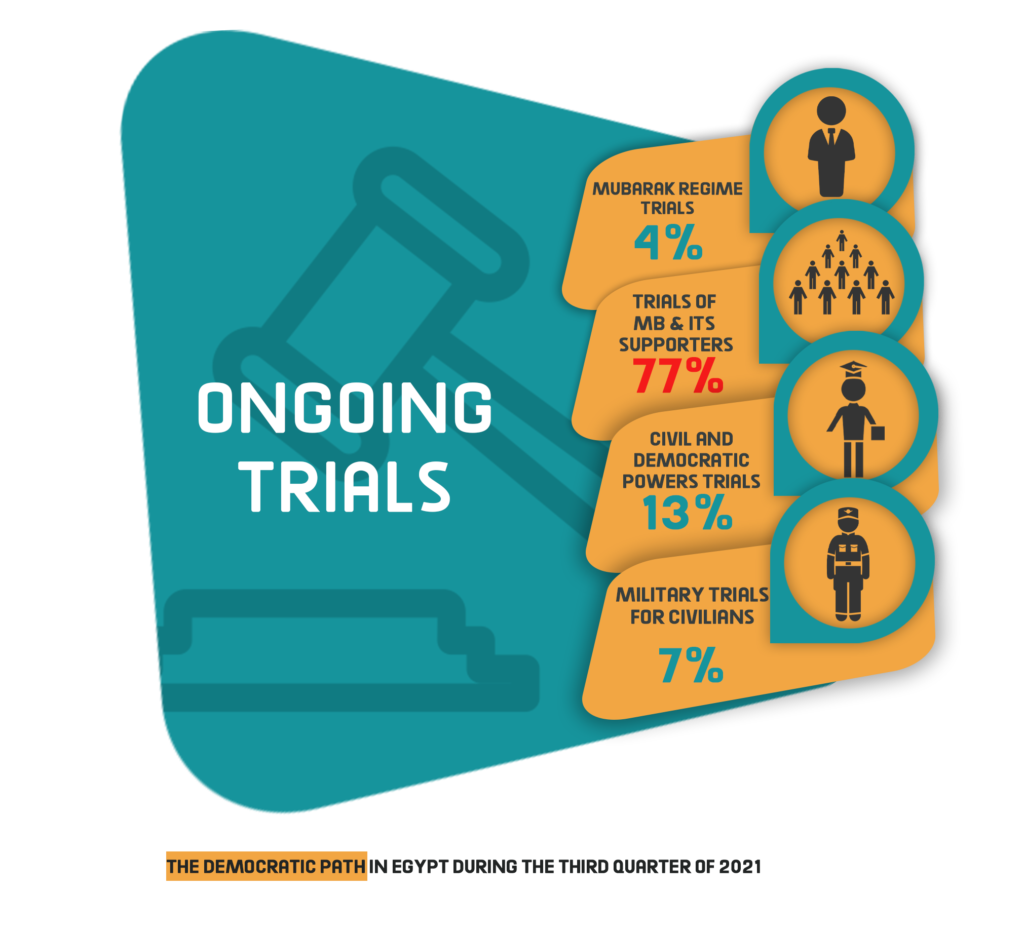
The most prominent trials of MB and NASL are:
Cases known in the media as: (Al-Mataria terrorist cell, Hisham Ashmawi cell, Al-Murabitin cell, Kuwait returnees, Aisha Al-Shater’s trial, Helwan Brigades, the Egyptian prisons raid, ISIS-Al-Zawiya Al-Hamra, Spying for Hamas, spying for ISIS, ISIS- Al-Agouza Cell, Jund Allah cell, Al-Mataria explosives cell, Al-Waili terrorist cell, Al-Manassa incidents).
The most prominent trials of Mubarak regime figures are:
Cases known in the media as: (Customs corruption, Green Belt).
The most prominent trials of civil and democratic powers are:
The cases known in the media as: (The Cabinet incidents, the trial of Ziad El Alimi and journalists Hisham Fouad and Hossam Mounes, the trial of Patrick George, the trial of Hossam Bahgat, and Esraa Abdel-Fattah’s appeal over the travel ban)
The Military Trials of civilians:
In the third quarter of 2021, the military judiciary considered three ongoing trials for 449 civilians.
2) Sentences
During the reporting period, there were 25 convictions and 10 acquittals. The details are as follows:
Convictions:
During the third quarter of the year, the Egyptian judiciary issued 25 convictions, distributed as follows:
* 22 rulings against the Muslim Brotherhood (MB) and its supporters
* One ruling against defendants affiliated with the civil democratic forces
* One ruling issued by the military judiciary against civilians
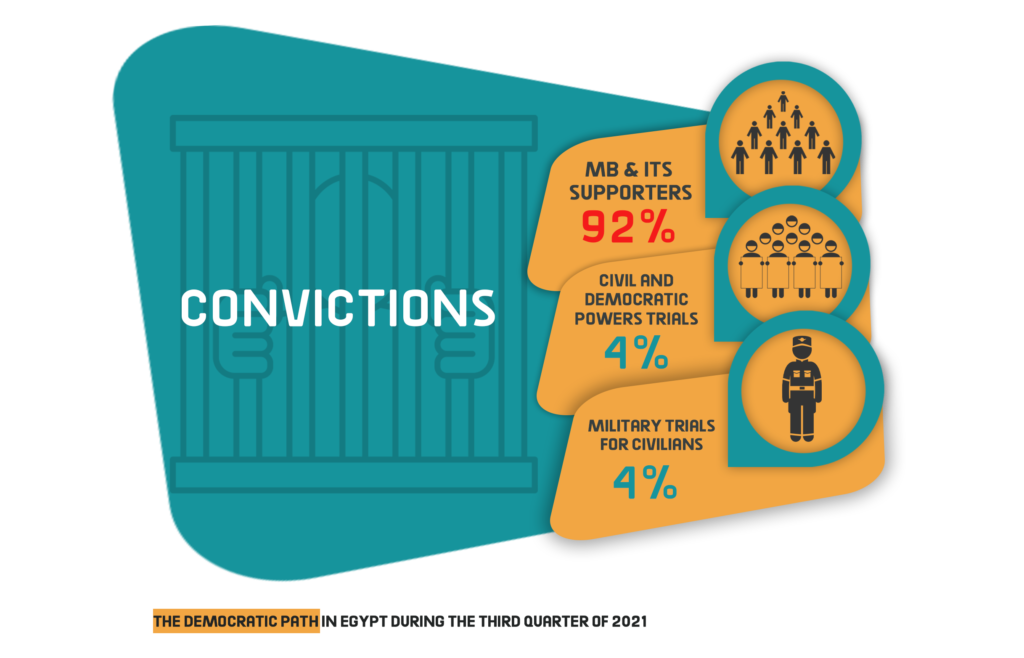
Acquittals:
During the third quarter of the year, ten acquittals were handed down as follows:
* Seven rulings for the MB and its affiliates
* One ruling for civil power
* One ruling of acquittal for Mubarak regime’s figures.
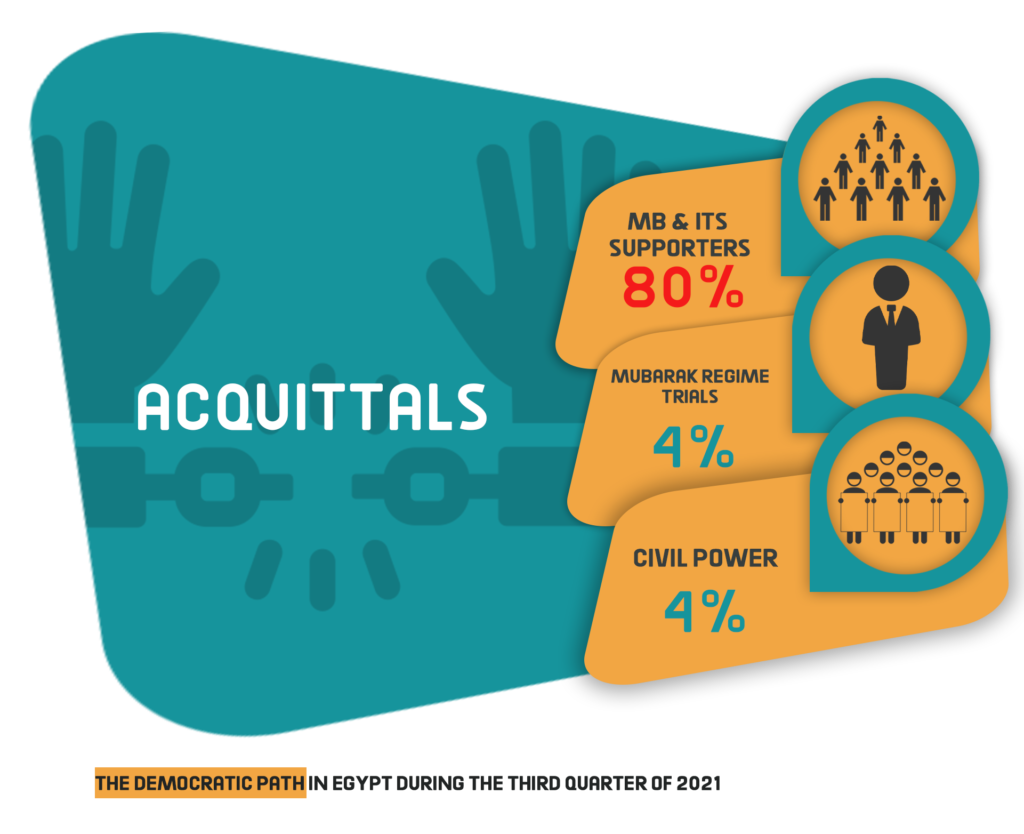
Death sentences
42 death sentences were issued during the third quarter of 2021, including 32 issued against 69 defendants over criminal cases and 10 rulings against 124 defendants pending political cases, as shown in the following table:
1- Rulings
| Total | Death sentences issued by military courts | Death sentences issued by civil courts |
| 42 | – | 42 |
2- Defendants
| Total (Number of defendants) | Number of defendants upheld by the Court of Cassation to be executed | Number of defendants upheld by the Mufti to be executed | Number of defendants referred to the Mufti | |
| 193 | — | 96 | 97 | Civil |
| — | — | — | — | Military |
| 193 | — | 96 | 97 | Total |
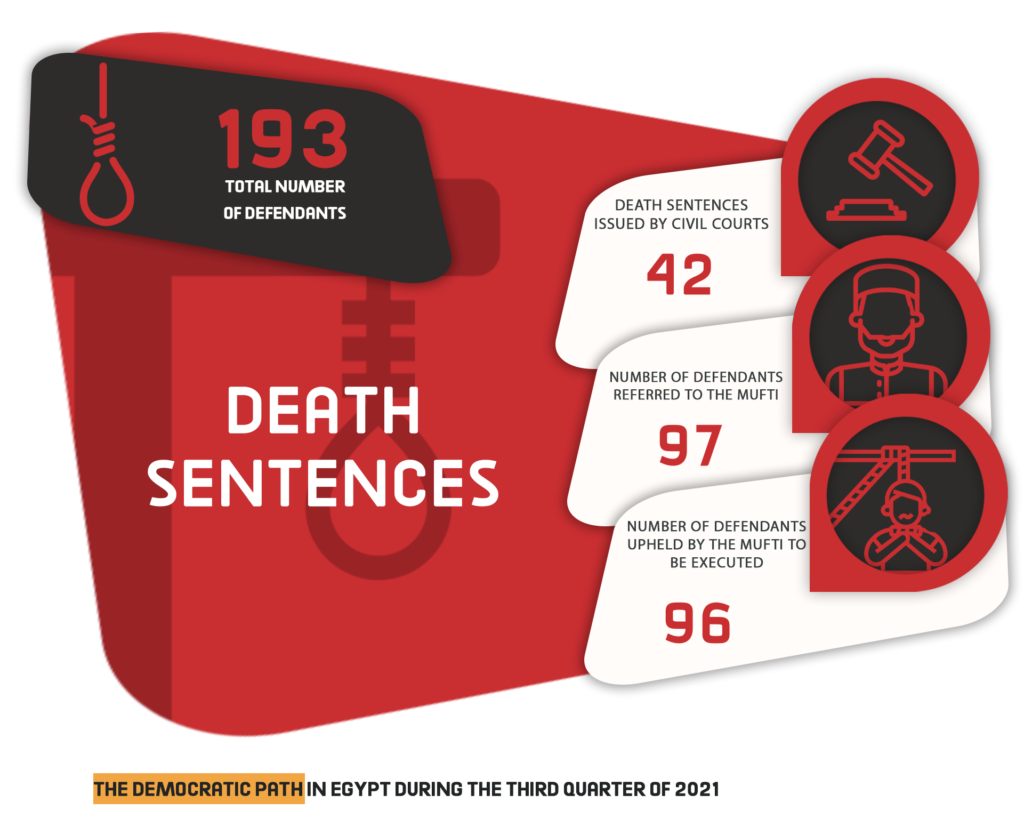
3- Death sentences executed:
The third quarter of 2021 witnessed the Prisons Authority sector carrying out two death sentences against two defendants, one over a criminal case and the other one over a political case as follows:
– On 4 July 2021, sources affiliated with the Ministry of Interior announced that the Egyptian Prison Authority sector in the Cairo Appeal Prison carried out the death sentence issued against a Muslim Brotherhood member, named Moataz Mustafa, accused in the case known in the media as the “attempted assassination of the Alexandria Security Director”.
– On 18 July 2021, the security forces executed the prison sentence issued against the defendant accused of killing his wife five years ago in Kafr Shehata village, affiliated to the Kafr Saad Center in Damietta governorate.
Third: Attack on Freedom of Expression and Media Freedoms
The third quarter of the year witnessed 35 various violations against freedom of expression and media freedoms.
The following table shows the number of violations took place throughout the third quarter of 2021:
| Number of violations | Months |
| 13 | July |
| 10 | August |
| 12 | September |
| 35 | Total during the 3rd quarter of 2021 |
Details are as follows:
| 18 | Investigations and detention renewal sessions |
| 5 | Administrative penalties (fines) |
| 3 | Coverage ban |
| 3 | Arrest and detention |
| 3 | Ban from appearing on media |
| 2 | Disciplinary measures |
| 1 | Physical and verbal assaults |
| 35 | Total of violations |
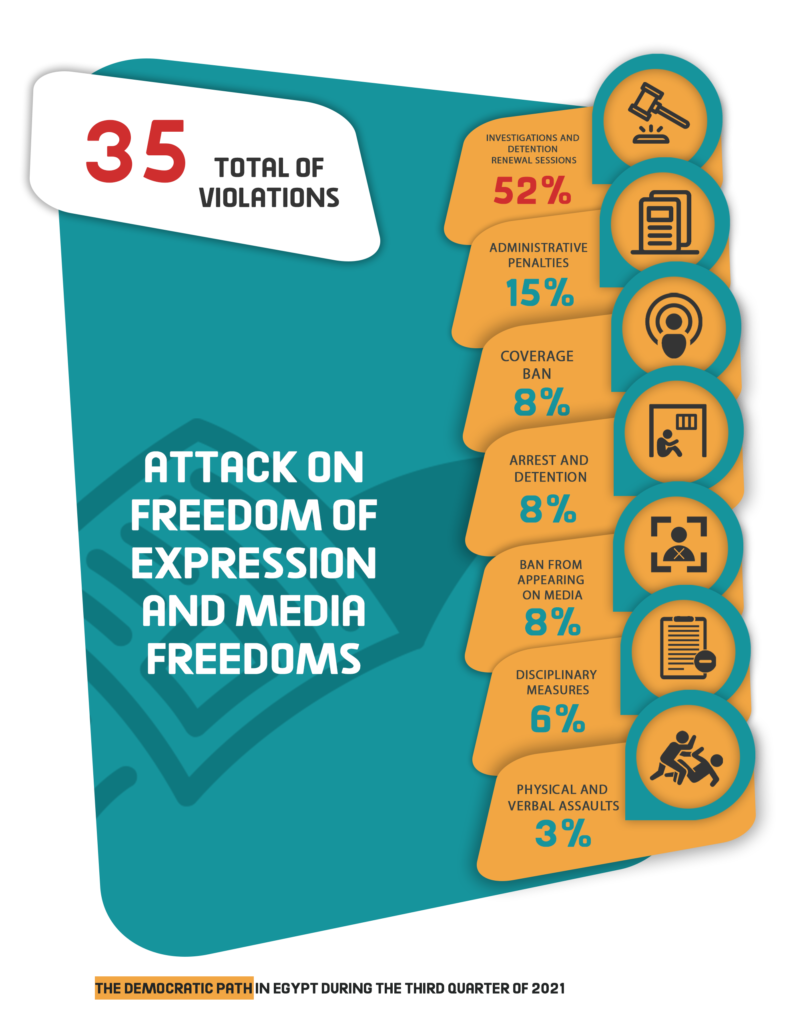
Fourth: Attack on Human Rights Defenders:
1- On 3 July 2021, Cairo Criminal Court considered the appeal submitted by activist and journalist Esraa Abdel-Fattah challenging the travel ban issued by the investigative judge mandated by the Minister of justice to investigate into the case known in the media as “closure of civil society”.
2- On 6 July 2021, Cairo Criminal Court ordered the continuation of the detention of human rights lawyer Mahinour El-Masry and journalist Esraa Abdel-Fattah for 45 days pending Case No. 488 of 2019 State Security, in which they are accused of colluding with a terrorist group in achieving its goals and publishing false news and statements. On 18 July 2021, the Supreme State Security Prosecution ordered the release of Abdel-Fattah under the guarantee of her place of residence pending the aforementioned case- along with Case No. 855 of 2020 State Security over the same charges. The release order has been implemented and the human rights lawyer has already been released.
3- On 6 July 2021, Cairo Criminal Court renewed the detention of engineer Yehia Hussein Abdel-Hady for 45 days pending Case No. 277 of 2019 State Security in which he is charged with joining a terrorist group, spreading false news and statements, and misusing social media.
4- On 11 July 2021, Cairo Criminal Court renewed the detention of human rights lawyer for 45 days pending Case No. 488 of 2019 State Security, in which he is charged with colluding with a terrorist group to achieve its goals and spreading false news and statements.
5- On 11 July 2021, Cairo Criminal Court renewed the detention of blogger Mohamed Oxygen and activist Sameh Seoudi for 45 days pending Case No. 855 of 2020 State Security, in which they are accused of joining a terrorist group.
6- On 11 July 2021, Cairo Criminal Court extended the detention of human rights lawyer Zyiad El-Eliemy and journalists Hisham Fouad and Hossam Moanis for 45 days, after exceeding the maximum limit of pretrial detention, pending Case No. 930 of 2019 State Security, on charges of colluding with a terrorist group to achieve its goals and spreading false news and statements.
7- On 13 July 2021, Cairo Criminal Court renewed the detention of researcher and journalist Shaimaa Sami for 45 days pending Case No. 65 of 2021 State Security, in which she was accused of joining a terrorist group and spreading false news and statements. On 29 August 2021, the security forces set the researcher free after the State Security Prosecution ordered her release under the guarantee of her place of residence.
8- On 15 July 2021, the Masr al-Qadima Misdemeanor Court adjourned the first trial session of human rights lawyer Zyiad El-Eliemy and journalists Hisham Fouad and Hossam Moanis pending Case No. 9170 of 2021 State Security Misdemeanor, registered under Case No. 930 of 2019 State Security, in which they face charges of spreading false news and statements.
9- On 29 August 2021, Cairo Criminal Court renewed the detention of linguist and human rights activist Ayman Abdel-Moati for 45 days pending Case No. 880 of 2020 State Security, in which he faces charges of joining a terrorist group, spreading false news and statements, and inciting protests without notifying the security authorities.
10- On 30 August 2021, Cairo Criminal Court renewed the detention of physician and activist Walid Shawqy for 45 days pending Case No. 880 of 2020 State Security, in which he is charged with joining a terrorist group, spreading false news and statements, and inciting to protest without notifying the security bodies.
11- On 30 August 2021, the investigative judge mandated by the Cairo Court of Appeal decided to shelve the investigation with human rights lawyer Negad El-Borai, human rights lawyer Azza Soliman and activist/journalist Esraa Abdel-Fattah in the case publicly known as “closure of civil society”, aka Case No. 173 of 2011 State Security.
12- On 7 September 2021, Cairo Criminal Court renewed the detention of labor leader Rashad Kamal for 45 days pending Case No. 1056 of 2020 State Security on a charge of joining a terrorist group with knowledge of its purposes and disseminating false news and statements.
13- On 11 September 2021, Cairo Criminal Court adjourned the first trial hearing of human rights lawyer Hoda Abdel Moneim, former member of the National Council for Human Rights, pending Case No. 1552 of 2018 Supreme State Security, on charges of joining and financing a terrorist group with knowledge of its purposes.
14- On 20 September 2021, the investigative judge mandated by Cairo Court of Appeal ruled there is no legal ground to pursue a criminal lawsuit against: the ‘Andalus Institute for Tolerance and Anti-Violence Studies’, the ‘New Future House Centre for Human Rights and Legal Studies’, the ‘Human Development Association in Mansoura’, and the ‘Egyptian Centre for Economic and Social Rights’ in connection with the case known in the media as “closure of civil society”.
15- On 26 September 2021, the Supreme Administrative Court adjourned the appeal No. 33178 of Judicial Year 67, filed by human rights lawyer Gaml Eid, the executive director of the Arabic Network for Human Rights Information (ANHRI), challenging the decision issued by the investigative judge to ban him from traveling, in connection with the case publicly known as “closure in civil society”. The consideration of the appeal was postponed for the session of the first of November 2021, to extract a copy of the travel ban order.
Fifth: Legislation and decisions affecting the democratic path:
1- On 12 July 2021, the House of Representatives, in its plenary session, approved the President of the Arab Republic’s Decree No. 290 of 2021, to extend the state of emergency declared in the country upon the Presidential Decree No. 174 of 2021, for further three months starting from one o’clock in the morning on Saturday, 24 July 2021.
2- On 24 July 2021, Egypt’s Prime Minster issued Resolution No. 1664 of 2021 identifying a set of crimes that are subject to the state of emergency which the Public Prosecution refer to the Emergency State Security courts, in accordance with the first article of the above-mentioned decision as follows: Crimes stipulated in Law No. 10 of 1914 regarding gathering, Crimes stipulated in Chapters One, Two, and Two (bis) of the Penal Code’s second book, Crimes stipulated in Articles 163 to 170 regarding disruption of transportation, and in Articles (172-174-175-176-177-179) of the Penal Code, Crimes of intimidation and breach of peace “bullying” stipulated in Chapter 16 of the Penal Code’s third book, Crimes stipulated in Law No. 48 of 1941 regarding the suppression of fraud and cheating, Crimes stipulated in Decree-Law No. 95 of 1945 on the food subsidy system (Tamween) and Decree-Law No. 163 of 1950 on Forced Pricing and Determination of Profits and the decisions implementing it, Crimes stipulated in Law No. 394 of 1954 regarding weapons and ammunition, Crimes stipulated in Book Three (not violating the agricultural land and preserving its fertility) of the Agriculture Law promulgated by Law No. 53 of 1966, Crimes stipulated in Law No. 113 of 2008 regarding preserving the sanctity of places of worship, Crimes related to the construction of buildings or the establishment of reconstruction works, or their expansion, elevation, modification, restoration or demolition without a license from the competent administrative authority, as well as crimes related to the establishment of reconstruction works without taking into account the technical principles established by law in the design, implementation, supervision or follow-up of implementation, or the non-conformity of the implementation with the drawings, data or documents over which the license was granted, or acts of adulteration in the use of building materials, or the use of materials that do not conform to the prescribed specifications stipulated in Articles (102 and 104) of the Building Law promulgated by Law No. 119 of 2008, Crimes of manslaughter, accidental injury, forgery of railway documents, or damage to the funds of the Egyptian Railways, which are committed by railway workers during the performance of their job duties, alongside the related crimes, Crimes stipulated in Law No. 34 of 2011 regarding assault on freedom of work and sabotage of facilities, Crimes stipulated in Law No. 107 of 2013 regarding the right to public meetings, processions and peaceful demonstrations, Crimes stipulated in the Anti-Terrorism Law promulgated by Law No. 94 of 2015.
3- On 12 August 2021, the President ratified Law No. 135 of 2021, amending some provisions of Law No. 10 of 1972 regarding the non-disciplinary dismissal of employees and the Civil Service Law promulgated by Law No. 81 of 2016.
4- On 19 August 2021, the Official Gazette published the ratification by the President of the Republic of Law No. 141 of 2021 amending some provisions of the Penal Code.
5- On 12 September 2021, the Permanent Supreme Committee for Human Rights, formed by the Prime Minister in 2018, launched the National Human Rights Strategy for the Arab Republic of Egypt 2021-2026.
Word
(1)- The Democratic Path is a report launched by the Arabic Network for Human Rights Information (ANHRI) in 2014. It is now released every three months, i.e. quarterly, but ANHRI used to publish it on a monthly basis during the previous years through the “Lawyers for Democracy” initiative.
In addition to the monthly reports issued to monitor the state of democracy, ANHRI issued annual reports to monitor the democratic path, which can be accessed through the “Reports” section on ANHRI’s website by clicking on the following link
Note: This report is based on the cases monitored and documented by the “Lawyers for Democracy” initiative’s team and does not necessarily include all the incidents that took place throughout the reporting period.







